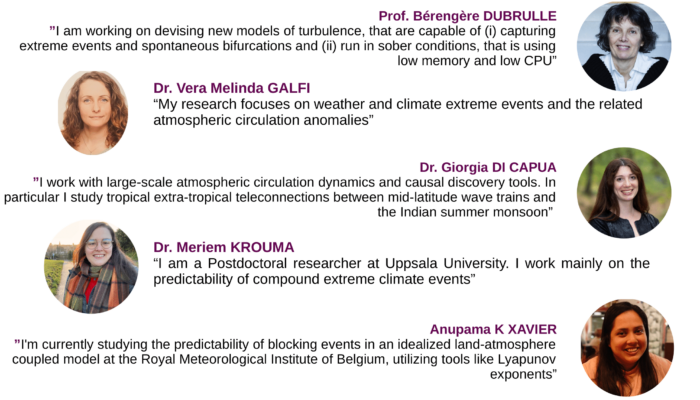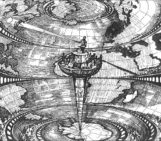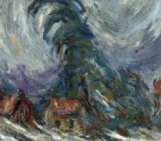
Brief description of their current research.
In celebration of Women in Science day, we delve into the experiences and insights of five accomplished women scientists in the field of Nonlinear Processes in Geosciences: Prof. Bérengère Dubrulle, Dr. Vera Melinda Galfi, Dr. Giorgia di Capua, Dr. Meriem Krouma, and Anupama K Xavier. Through a series of interviews, these women share their journeys, addressing challenges faced as women in science, strategies for work-life balance, valuable advice for newcomers, and the positive experiences and role models that have shaped their paths. Join us as we uncover the unique stories and perspectives of these scientists, providing inspiration and guidance for the next generation of women in science.
As a woman in science, have you faced any challenges in your career or encountered any gender-specific biases? If so, how have you addressed these issues?
- B. Dubrulle: As a woman, I encountered two challenges: (i) as a scientist working with experimentalists, I had to convince them that I was able to understand “mechanical problems” and provide interesting ideas (ii) as a mother of 4 children, I had to be able to conciliate an intense family life, that prevented me from travelling as much as my male colleagues, and requirements of hich scientific research, (students, publications, advertisement, getting contract). Issue (1) was dealt by time, and nice colleagues, who realized my capabilities. Issue (2) was solved only when my children got older, and I could start travelling, once or twice a year, preferably in France or in close Europe (due to my conviction regarding Climate change, I chose to avoid plane anyway)
- M. Galfi: I sometimes encountered gender-specific biases on a personal level coming from male colleagues, but I never felt that gender-specific biases hindered my scientific career. I actually received a lot of support from my male supervisors and colleagues, which were very beneficial for my career. However, one definitely notices that the number of male scientists in influential scientific positions outweighs by far the number of women scientists on the same level. It is important that this changes in the future.
- G. Di Capua: In my experience, the men/women ratio in above-postdoc positions (professors, heads of departments, etc) is still noticeably biased towards men. It happens to hear sexist comments, that is really not unusual. One should however reflect on the fact that it is not possible to answer to this question in more details and then sign the interview.
- M. Krouma: I have faced a lot of challenges, but I do not think they were related to gender bias because I have never seen my gender as a problem or as something that could stop me from doing something. Also, I never see myself as less or more important than any other gender. However, I notice that women are under-represented in science, which can be related to some issues of gender inequality in salaries and opportunities, as well woman are judged most of the time for anything and everything.
- A. K Xavier: Being a woman in science from a patriarchal society poses challenges, where societal norms question priorities. Overcoming biases involves taking the right path regardless of others’ opinions, hoping for a future of equal treatment.
What strategies have you found helpful for maintaining work-life balance?
- B. Dubrulle: Always be focus on the thing I was doing: if I am with kids, I focus on them; if I am at work, I focus on work.
- M. Galfi: Honestly, I am still searching for work-life balance, and I am not sure whether it indeed exists. It is definitely something individual, and what works for one person might not work for the other. In academia, we have often very intense work periods. I think that one of the most important rules, is that such periods should not be too long (now it depends on the person how long is “too long”), and that there is a recovery period following them. Another rule is to not forget that we are doing this job because it is super exciting and important. I mean to focus on the deeper reasons instead of temporary difficulties, self-doubt and stress.
- G. Di Capua: Leave the laptop in the office whenever possible. Working from the office as much as possible, so that when I am at home, it is easier not to think about work. Be clear with yourself, if you decide that it is worth spending your free time working, that is a choice you can make. However, if you want to enjoy your free time doing not-work related activities, you need to actively work to safeguard it, first of all from your own wish to work more.
- M. Krouma: It is a bit hard and quite challenging to keep a perfect work-life balance in general. My strategy is that I am the master chief of this balance. So when I need to dedicate more time to work, I do it, meanwhile I always try to reserve some time in my life, to meet family and friends, to travel, or at least to eat something delicious even once a week. This way of breathing out the work sphere is important and healthier for me. In the end, even if I give more time to work compared to my personal life, I try as much as I can to enjoy every single moment and to see the positive from each experience, and that helps a lot. Of course, there are some irreplaceable moments in someone’s personal life, and of course, I (and I will) devote as much time as I can to those specific moments.
- A. K Xavier: Work-life balance in research, with its inherent uncertainty, is a persistent challenge. As a beginner, managing long working hours and stress remains an ongoing task.
What advice would you give to women who are starting out in this field?
- B. Dubrulle: Do not underestimate yourself. Do what you think is good. Do not worry about what others say. Do not ask too many questions about how to combine family life and work. Research is a nice field and allows a lot of flexibility to cope with problems related to child caring.
- M. Galfi: Women often tend to underestimate their skills and abilities. Thus, my advice is: Be proactive and “exaggerate” slightly your skills/abilities when applying for a job, a grant or even when it is just about your own self-image. It feels a bit uncomfortable, but it is probably closer to reality than if you would be completely honest.
- G. Di Capua: Do not be discouraged if you encounter sexist behaviour. You are not in the wrong and there is no excuse for it. Don’t be afraid to share your experience, you will find that you are not alone. Remember that it is not only your job to organize, listen to, and make sure everyone feels comfortable.
- M. Krouma: Believe in yourself, follow your interests and passions and never underestimate who you are! I would say those words to anyone who ever wants to achieve anything in life. Never limit yourself to societal or cultural norms; surround yourself with supportive people who push you to improve. Many women achieved and continue achieving amazing things in science, and the secret behind that is that they truly go for what they want and never give up. Never be afraid to fail or reach out for help this is normal and part of the process; be as much as you can supportive and helpful to others.
- A. K Xavier: To fellow women entering the field, I advise ignoring external criticism, acknowledging the extra effort required, and not feeling ashamed to express feelings and choices.
Have you had any positive experiences or role models that have helped you navigate the challenges of being a woman in science, and if so, can you share some of these experiences?
- B. Dubrulle: I learned about research looking at a picture of Marie Curie in a history book. Seeing a women doing research taught me that it was a work that could also be done by a women.
Then , as a student, I met Françoise Combes in the astrophysics department of the Ecole Normale Supérieure (ENS), and she gave me some very useful advices to choose my classes, and she acted as a tutor during my first two years at the ENS. Then all along my carreer, she provided me with some support that helped me become what I am now.
Later, I met Annick Pouquet, who was a senior researcher working on the sale topic than me (theoretical turbulence and applications in Astro and geophysics). I was amazed how she was able to direct a large group of PhDs and Post-docs, with a lot of humanity and humor, and later, I copied the way she organized her group and behaved with students and post-docs. She has really been a model for me. - M. Galfi: Positive experiences: yes; role models: no… unfortunately. My professors and mentors were mainly men. I did encounter inspiring women professors and researchers, but I did not manage to really know them better and to build up a closer relationship with them. I also had the impression that some women professors are very “tough” – probably also due to the obstacles they had to face when building up their scientific career – and thus approaching them feels quite intimidating for early career researchers. This is also something we have to keep working on in the future. I do have several women colleagues though, who are very inspiring.
- G. Di Capua: I have been lucky to work with amazing female colleagues, who have certainly been of great inspiration. But I have experienced a lot of support also from male colleagues, especially when trying to learn to speak up for myself and recognize my self-worth.
- M. Krouma: I would say that all women, whatever their field and who they are, are role models! In the field of science, I have met a few amazing women who have helped me to overcome some challenges and give me a lot of inspiration. I would particularly mention one scientist who is a real role model for me and has inspired me a lot. She is a climate scientist and a head of a team in Météo France. She accepted me for a 2-month visit to her team during my PhD and kindly dedicated her time to help me in my PhD project. I remember that I had to share the office with her, and I am thankful for all the time I spent with her. She was very supportive, helpful and intelligent. She helped me a lot, mainly to explain ideas in a better and clearer way, thanks to her constructive questions and advice. She was of great support to me in a particular challenge that I had to go through before my defence. In addition to her great expertise in her work, she is a pleasant mother and colleague. She also dedicates time to mentor young girls to make successful plans for their future studies. Her commitment and hard work are just amazing and of great inspiration to me. Lauriane Batté was and always will be a great example to follow, and I hope that one day, I can be like her.
- A. K Xavier: My role model is my mother, a science enthusiast and chemistry teacher. As a woman in science, she never questioned my decisions but consistently offered various perspectives to help me make meaningful choices. She has exemplified how to successfully balance family life while pursuing a career, serving as an inspiration for being both family-oriented, independent and career-driven.



